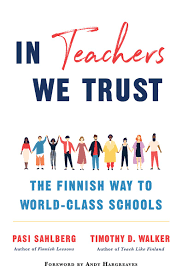In their book In Teachers We Trust: The Finnish Way to World-Class Schools, Pasi Sahlberg and Timothy D. Walker draw on seven key principles from the Finnish education system that can help build inclusive and thriving school communities, positioning trust as the key ingredient for educational excellence. The book offers an accessible, relatable and timely contribution to the field of education, particularly teacher professional learning, writes Maja Milatovic.
In Teachers We Trust: The Finnish Way to World-Class Schools. Pasi Sahlberg and Timothy D. Walker. W.W. Norton & Company. 2021.
 Find this book (affiliate link):
Find this book (affiliate link): ![]()
Teaching is an ever-evolving profession which requires commitment, dedication, knowledge and resilience – but above all, a true passion for education. But what makes a good teacher? What motivates teachers to stay in the profession? What allows teachers to thrive, innovate and continuously learn?
Pasi Sahlberg and Timothy D. Walker’s book, In Teachers We Trust: The Finnish Way to World-Class Schools, aims to address some of these questions. As experienced teachers, authors, leaders and education experts, Sahlberg and Walker draw on decades of teaching experience and scholarly research to inform their work.
The book revolves around the concept of trust, envisioned as the key ingredient for educational excellence. In other words, trust in teachers’ capacities, professionalism, creativity, autonomy and informed choices is the building block of thriving schools. Highlighting the importance of treating teachers as knowledgeable professionals who continuously nurture trusting, collaborative relationships from pre-service teacher training to daily classroom challenges, Sahlberg and Walker’s book offers an accessible, relatable and timely contribution to the field of education, particularly teacher professional learning.

Image Credit: Photo by Element5 Digital on Unsplash
The book revolves around seven key principles which the authors explain through engagingly structured chapters. Specifically, the book is divided into two parts: Part One provides the context to the book and the authors’ personal journeys of teaching across contexts. It also involves a detailed discussion of the Finnish cultural context and the way the notion of trust has evolved in Finnish culture and informed pedagogies and policies.
Part Two of the book is divided into seven chapters, with each chapter dedicated to one of the seven key principles. Apart from success stories featuring experienced educators and teachers in training, the chapters also contain a ‘strategy box’ with practical suggestions for implementing each of the seven principles. Each chapter also ends with a list of questions for ‘Conversation and Reflection’ to promote further inquiry and exploration.
The first two principles, ‘Educate teachers to think’ and ‘Mentor the next generation’, engage with teacher professional learning, pre-service teacher education and the empowering role of mentoring through stories of experienced Finnish educators and teachers in training. Crucially, the authors highlight the importance of giving teachers time and space to actively reflect on the way they teach and they suggest using journaling methods to support this process. Here, the reflective practitioner who consciously learns, grows and innovates is an important factor in creating a culture of trust in schools. Building on this principle is the authors’ emphasis on mentoring and its role in creating confident teachers who see themselves as knowledgeable professionals.
The third principle’s chapter, ‘Free within a framework’, discusses the importance of teacher autonomy. Drawing on scholarly research and evidence, the authors contend that when teachers consider their profession as highly regarded, with its own knowledges, standards, quality teacher education and autonomy to make their own choices, they tend to be more productive (83). This particular principle is especially relevant for school leaders, who the authors see as central to nurturing teachers’ professional autonomy. According to the authors, this not only builds trust but also leads to pedagogical improvements where teachers can be creative, energised and innovate.
The fourth principle, ‘Cultivate responsible learners’, builds upon the importance of autonomy in the context of student-centred teaching and learning. Using examples from Finnish education, the authors demonstrate that students learn effectively and remain motivated when they are actively involved in their own learning and empowered to make choices on what and how they learn.
The fifth and sixth principles, ‘Play as a team’ and ‘Share the leadership’, revolve around collaboration as another key ingredient in building trust. The authors explore a range of approaches and reflexive stories which can help build inclusive and welcoming school communities. Apart from practical suggestions on team-building and fun activities, the authors again highlight the importance of giving teachers time and space – not only to reflect on their practice but also to collaborate. Exploring effective and collaborative leadership models, the authors discuss examples of effective ‘high-trust school leaders’ who are able to motivate their staff to excel in their teaching and exceed expectations. Importantly, the authors posit shared leadership as an alternative to authoritarian, ‘top-down’ managerial approaches which ‘erode the trust relationships between teachers and principals’ (131).
The final principle, ‘Trust the process’, affirms the role of trust in building inclusive and thriving school communities. Motivating teachers to do a good job, use their professional judgement and develop as reflective practitioners requires school leaders and communities to work collaboratively, transparently and build a culture premised on trust.
Together, the seven principles explicate ‘the Finnish way’ to achieve educational excellence, as declared in the book’s title. Throughout the book, the authors analyse and evaluate the reasons behind Finland’s excellence in education, its students’ high performance and its competitive teacher education programmes. This contextualisation allows readers to understand Finnish culture and the ways in which history and society inform its education and pedagogy. However, the authors’ positioning of Finnish culture is relational rather than hierarchical – it invites readers to consider how Finnish approaches could be applicable and translatable across cultures without perpetuating imperialist discourses. Specifically, the authors do not posit Finnish educational models as superior forms of knowledge, actively inviting dialogue, knowledge exchange and collaboration.
Overall, this book offers timely insights and suggestions on how to build inclusive and thriving school communities which value both teachers and students. The book’s emphasis on trust is particularly relevant in the context of the globalisation and marketisation of education, including high stakes testing and increased competition. This book will be of interest to educators and leaders striving to create meaningful change and nurture positive and enabling relationships within their own communities. The suggestions from the book are also applicable to other contexts such as vocational education and universities, and it may interest postgraduate students and researchers in the fields of education, management and organisational psychology.
Note: This review gives the views of the author, and not the position of the LSE Review of Books blog, or of the London School of Economics and Political Science. The LSE RB blog may receive a small commission if you choose to make a purchase through the above Amazon affiliate link. This is entirely independent of the coverage of the book on LSE Review of Books.







